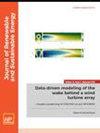基于 Stackelberg 博弈框架的电动汽车负载工业综合能源系统的经济与低碳调度
IF 1.9
4区 工程技术
Q4 ENERGY & FUELS
引用次数: 0
摘要
工业综合能源系统(IES)和电动汽车(EV)为应对日益严峻的能源危机和环境污染挑战提供了新的解决方案。随着工业综合能源系统中电动汽车和智能充电站数量的不断增加,电动汽车不协调的充电负荷给综合能源系统带来了巨大压力。因此,一个设计合理的调度方案对于降低双方的经济成本、缓解 IES 的能源供应压力、促进低碳社会的发展至关重要。为此,考虑到电动汽车在工业 IES 中的负荷特性,我们提出了一个基于 Stackelberg 博弈论的调度框架,其中包括领导者和追随者。领导者 IES 负责制定单位调度和需求响应计划,并确定智能充电站的充电定价。跟随者智能充电站通过最小化充电成本来优化电动汽车的充电功率,以保护电动汽车车主的利益。此外,我们在充电站定价中引入了碳排放流量模型,将碳排放责任从发电侧转移到电动汽车负载侧。考虑到双层博弈模型的求解难度较大,我们利用卡鲁什-库恩-塔克条件和对偶定理将其转化为等效的单层优化问题,从而轻松求解。仿真结果表明,所提出的博弈框架能有效降低工业能源系统的经济成本和电动汽车的充电成本,缓解充电负荷压力,减少工业能源系统的碳排放。本文章由计算机程序翻译,如有差异,请以英文原文为准。
Economic and low-carbon dispatch of industrial integrated energy system with EV load based on Stackelberg game framework
Industrial integrated energy systems (IESs) and electric vehicles (EVs) provide new solutions for addressing the increasing challenges of the energy crisis and environmental pollution. With the increasing number of EVs and smart charging stations in industrial IES, the uncoordinated charging load of EVs imposes significant pressure on IES. Therefore, a well-designed dispatch scheme is crucial for reducing the economic cost for both parties, alleviating the energy supply pressure on IES, and promoting the development of a low-carbon society. To this end, given the load characteristics of EVs in industrial IES, we propose a dispatch framework based on the Stackelberg game theory, which includes the leader and the follower. The leader IES is responsible for formulating both unit dispatch and demand response plans, as well as determining the charging pricing for the smart charging station. The follower smart charging station optimizes EVs charging power by minimizing the charging cost in order to protect the interest of EV owners. Additionally, we introduce the carbon emission flow model into charging station pricing to shift the responsibility for carbon emissions from the generation side to the EV load side. Considering that the two-layer game model is difficult to solve, we use the Karush–Kuhn–Tucker condition and duality theorem to transform it into an equivalent single-layer optimization problem, which is easily solved. Simulation results demonstrate that the proposed game framework effectively reduces the economic cost of IES and the charging cost of EVs, alleviates the pressure from charging load, and reduces the carbon emissions of industrial IES.
求助全文
通过发布文献求助,成功后即可免费获取论文全文。
去求助
来源期刊

Journal of Renewable and Sustainable Energy
ENERGY & FUELS-ENERGY & FUELS
CiteScore
4.30
自引率
12.00%
发文量
122
审稿时长
4.2 months
期刊介绍:
The Journal of Renewable and Sustainable Energy (JRSE) is an interdisciplinary, peer-reviewed journal covering all areas of renewable and sustainable energy relevant to the physical science and engineering communities. The interdisciplinary approach of the publication ensures that the editors draw from researchers worldwide in a diverse range of fields.
Topics covered include:
Renewable energy economics and policy
Renewable energy resource assessment
Solar energy: photovoltaics, solar thermal energy, solar energy for fuels
Wind energy: wind farms, rotors and blades, on- and offshore wind conditions, aerodynamics, fluid dynamics
Bioenergy: biofuels, biomass conversion, artificial photosynthesis
Distributed energy generation: rooftop PV, distributed fuel cells, distributed wind, micro-hydrogen power generation
Power distribution & systems modeling: power electronics and controls, smart grid
Energy efficient buildings: smart windows, PV, wind, power management
Energy conversion: flexoelectric, piezoelectric, thermoelectric, other technologies
Energy storage: batteries, supercapacitors, hydrogen storage, other fuels
Fuel cells: proton exchange membrane cells, solid oxide cells, hybrid fuel cells, other
Marine and hydroelectric energy: dams, tides, waves, other
Transportation: alternative vehicle technologies, plug-in technologies, other
Geothermal energy
 求助内容:
求助内容: 应助结果提醒方式:
应助结果提醒方式:


